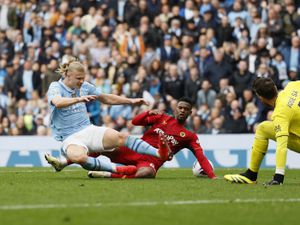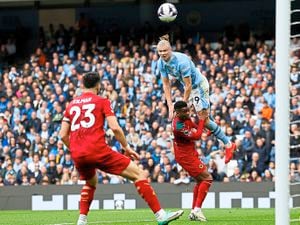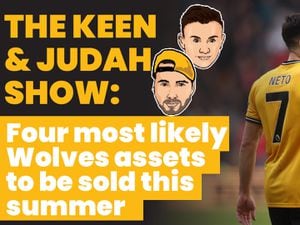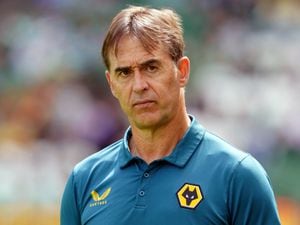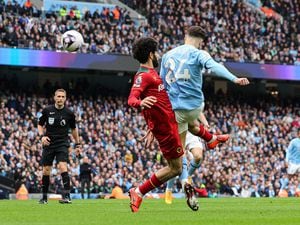Sky Sports' Johnny Phillips: Forget the collapse, it’s a whole Nu era
The noise is too noisy. They’ve got to shut the noise off.
Those were the words of Sam Allardyce reflecting on the external voices that he believed were affecting his Crystal Palace squad this time last year, ahead of a relegation showdown at home to Middlesbrough, writes Johnny Phillips.
Allardyce’s team had won just one of eight games during his opening two months at the club. The south Londoners looked a solid bet for relegation, with only Sunderland below them in the table.
In the event, Palace beat Middlesbrough and went on to pull well clear of trouble. The point Allardyce was making about the noise was one that concerns all managers.
Fans and the media had been on Palace’s case for weeks and Big Sam was fearful that his players were taking it in; reading the papers, watching the television shows and browsing social media.
This happens at the top too, when the plaudits and the hype come along.
Wolves are the focus of a different kind of attention to that directed at Palace. Excitement levels amongst supporters are reaching fever pitch. With a run of televised fixtures the national media is getting involved too as the team’s performances reach a wider audience. This article, too, is adding to the noise.
Supporters can let their minds run away – often in different directions. In the last week alone, opinion on Wolves’ prospects for the rest of the season has veered between the doomsayers refusing to look past the next game, fearing a collapse in the manner of the infamous 2001/02 season, and the romanticists suggesting this is the greatest Wolves team to have played in the last 50 years.
The 2001/02 collapse was not so much a dagger through the heart for supporters at the hands of their arch-rivals, more a slow and torturous death.
An 11-point lead in March, squandered with seven games remaining. It was the stuff of nightmares, but the issues back then are hardly applicable now.
Albion had a game in hand, won it and reduced the gap to eight. Surely still impregnable – on the face of it – but there were cracks in the Wolves team that don’t exist in the current set-up. The starting XI that conceded a two-goal lead in drawing at Nottingham Forest in early March included Kevin Muscat, Mo Camara and Keith Andrews in the starting line-up. All had their merits but they were clearly not Premier League stars in waiting. When Muscat was sent off during a home defeat to Grimsby later that month, the rot had begun to set in.

By April, journeymen Gunnar Halle and Kevin Cooper were getting a start. There were too many weak links in contrast to the current team’s strength from one to 11. Nuno’s bench last Saturday spoke volumes with Benik Afobe, Leo Bonatini and Danny Batth amongst others waiting for their chance.
When Jones’s side garnered only 10 points from the final nine games, the weaknesses were revealed, despite the significant investment back then too. The Wolves of 01/02 didn’t have sufficient depth whereas Nuno’s team are getting better.
Huge credit should also go to Gary Megson’s Albion for their fantastic finish to the season, with eight wins and two draws from the final 10 games. Could any of today’s Championship promotion chasers mount that sort of challenge? It was a phenomenal run and when they won with a last gasp penalty at Bradford, in the penultimate match of the season, it proved a fatal blow to Wolves’ hopes.
If the more cautious Wolves fan still refuses to look past the next game that is fine, but there is no point being burdened by a historical anomaly.
On the other hand, there are those getting understandably carried away. Not being old enough to remember the last major trophy win, this certainly feels like the best team of my generation. But that is not anything to shout about – Wolves have been mediocre for the last 35 years.
The Jones and Mick McCarthy Premier League teams were not up to scratch and there was no ambition other than survival. History judges both those wasted top-flight spells badly.
But listening to some more seasoned fans suggesting this side is better than the teams of the Seventies is interesting. There is certainly the potential for the club, with more significant investment, to establish itself as a genuine Premier League force.
But surely there is a long way to go before it can be compared to anything achieved in the era of Richards, Wagstaffe, Hibbitt and co?
A quick glance at the records is all that is required to verify the quality of that team.
A top-four finish in 1971 was backed up with a UEFA Cup final appearance the following year, a fifth place finish in 1973 and a League Cup win the year after that.
Even after the relegation of 1976 they quickly returned, lifting the League Cup again in 1980 and recording a sixth-placed finish in the league.
That some are allowing themselves to get carried away like this perhaps shows just how far Nuno’s team have come.
They play a style of football geared for the Premier League and are giving immense pleasure to supporters. The noise is getting louder.
Allardyce reflected on how hard it was for his Palace players to keep clear minds as they prepared for the final weeks of last season.
“They spend a long time away from the football club so you don’t really know whether they listen to the noise or not.”
Supporters and the media are supposed to make noise, it is what we do. Nuno knows this too. But he will be hoping his players don’t pay attention to a single word of it.

